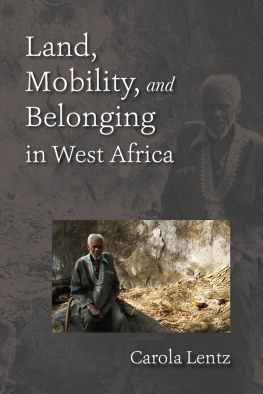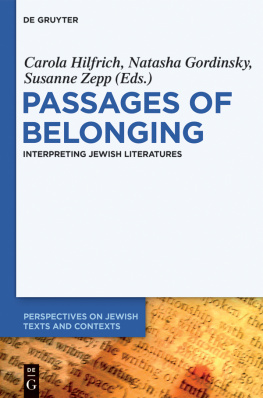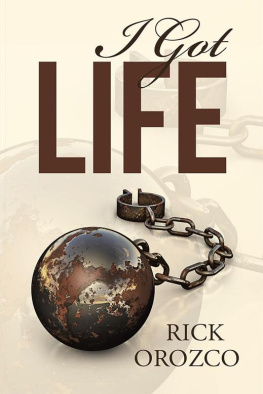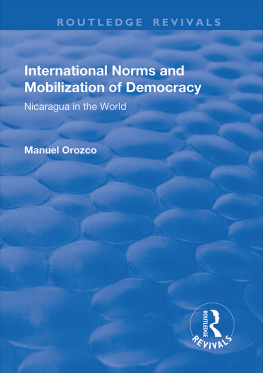While we are the sole parents of this book, many members of our extended family have been involved in its delivery and upbringing. It is a treat for us to thank all of the individuals and institutions that have so generously supported us during this project.
First and foremost, we would like to thank our immigrant informantsthe children, their parents and relatives, and their friends. Over the years, they trusted us by opening their lives to us; in turn, we have tried to be faithful in relating their stories. Without them there would be no story to tell. These children and families brave discouraging odds in search of a better tomorrow. May their drive and faith be an example to us alland may their new country live up to the challenge of harnessing their energies.
Families can thrive when they have generous godparents. We have been blessed by funding from oursthe W. T. Grant Foundation, the Spencer Foundation, and the National Science Foundation. Without their essential support we would have had a much less rich story to tell.
The main function of the family is the transfer of skills, values, and worldviews to the next generation. Other than the moving stories that immigrant children told us during our research, nothing has been more gratifying than to work with an extraordinarily talented group of young researchers who have been involved in various capacities with the Harvard Immigration Project. These research assistants have been our eyes and ears into immigrant homes, schools, and neighborhoods. Over the years, we have been stimulated by their penetrating insights, eager to hear the priceless vignettes they could not wait to share, and disheartened by some of what they encountered. They have kept us grounded and honest with the freshness and fearlessness of their gaze. Their intellectual integrity and humanistic commitment to the communities in which they work has been an invaluable gift. Those working with us at the time of the writing of this book are Jeannette Adames, Laura Alamillo, Lilian Bobea, Marco Bravo, Carmina Brittain, Alix Cantave, Sophia Cantave, Alexandra Celestin, Valerie Chanlot, Jennifer Chen, Dafney Dabach, Charlene Desir, Celeste Guterrez, Teresa Huerta, Iris Siu-Wai Hui, Jill Jefferis, Yih-Shiuan Liang, Mnica Lpez, Julia Macias, Marcela Nazzari, Mariela Paez, Claudia Pieda, Desiree Qin-Hilliard, Breca Rodriguez-Griswold, Leah Rosenbloom, Eliane Rubinstein-Avila, Irina Todovova, Peichi Tung, Yu-Mui Cecilia Wan, and Rebeca Zichlin. Those who have participated in the project in the past in various capacities include Consuelo Aceves, Esther Adames, QunWei Ai, Rosa Armendriz, Joelle Berthelot, Linda Caswell, Virginia Chan, Nhi Chau, Sonya Contero, Yohanni Cuevas, Emmanuel Daphnis, Elsa Garcia, Sarah Hughes, Norma Jimenez, Rachel Kline, Marlene Losier, Josephine Louie, Nurys de Oleo-Park, Regine Ostine, Debra Rodman, Griselda Santiago, Eric Shaw, Zuwei Shi, Liz Vazquez, and Claire White. While every one of the research assistants has had something important to contribute to this project, Carmina, Charlene, Eliane, Jill, Mariela, and Yu-Mui have been centrally involved in nearly every aspect of the research: conceptually, methodologically, and in the field. It has been an honor to work with you all.
We also would like to say a special thank you to the members of our research support staff: Jennifer Hayes, Kimberly McGuffie, and Christina Nikitopoulos. While the research assistants have a good sense of what is going on in the sites they themselves are studying, Jennifer, Christina, and Kimberly have the big picture of the overall project. We have benefited from their counsel, especially when they have alerted us to similarities and discontinuities across sites. They are gracious, ever helpful, and more than once have performed exemplary work under the stress of impending deadlines.
A project of this magnitude can only be developed and sustained by the creative and intellectual efforts of a community of scholars. We are thankful to Terry Tivnan of the Harvard Graduate School of Education for his statistical and methodological guidance as well as his wonderful sense of humor.
In California, Curtis Vaughn has been responsible for managing our contingent of nearly a dozen graduate students from U.C. Berkeley, U.C. Davis, and elsewhere who have been working with us in the Mexican and Central American communities. We are grateful to Dr. Vaughn for the leadership and peace of mind he has afforded us.
Many senior colleagues from Harvard and elsewhere have lent their expertise to our project. Gary Orfield, Susan Moore-Johnson, Min Zhou, Paul Farmer, Sau Fong-Siu, Peggy Levitt, Alejandro Portes, George Spindler, and Mary Waters have all made presentations to the training seminar for our research assistants. We would like to especially thank Professor Waters for sending us an advance copy of her wonderful new book, Black Identities.
George De Vos, Celia Falicov, and John Ogbu have been mentors whose valuable insights have guided our development as scholars of immigration.
Kurt Fischer, Robert Levine, and Catherine Snow of the Harvard Graduate School of Education have steadily supported our research efforts since we made the move from California to Harvard.
John Coatsworth, director of Harvards David Rockefeller Center for Latin American Studies, also welcomed us with a warm abrazo and provided us with wise counsel and much needed support, especially during the gestational period of this project.
Our dear Harvard colleague Doris Sommer has been a source of warmth and inspiration.
We would like to share our gratitude for the valuable feedback on portions of this book given by Maria Carlo and Sofia Villenas (both of Harvard University).
We are deeply indebted to June Erlick, publications director of the David Rockefeller Center for Latin American Studies, for many careful readings of versions of this manuscript. June is an exacting critic, a readers reader, and a generous friend.
Marcela Nazzari provides our home during our regular monthly stays in California when we fly out to supervise the West Coast contingent of research assistants. She has long been our spiritual godparent.










